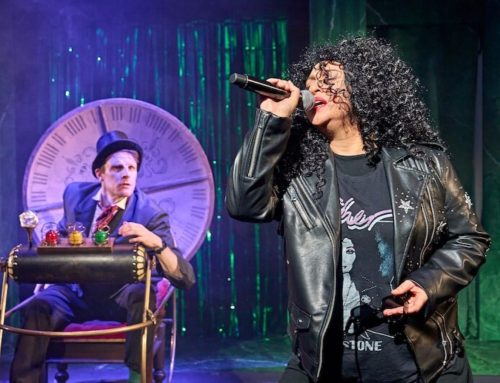Lisa Lintott’s debut bioplay Going For Gold won three Black British Theatre Awards last year following a short run at the Chelsea Theatre, including the Best Male Lead Actor gong for her son Jazz Lintott. Press reports suggest the writer was so disheartened her offspring was only offered “drug dealer or terrorist” roles that she wrote a piece for him to star in. Actor Lintott shines in the true story of Frankie Lucas, a prodigiously gifted young black boxer navigating racism, endemic institutional corruption, drug use and related mental health issues. Writer Lintott condenses too many events and too much boxing minutiae in an over-egged and over-long middle section, leaving the piece struggling for narrative momentum. Boxing commentators might call it a “drawn-out bout”.
Aged 9, St Vincent-born Lucas joins a South London boy’s boxing club where he is taken under the wing of Police Officer turned boxing trainer Ken Rimmington (Cyril Blake brings vividly to life the shocking casual racism endemic to the 1970s). Boasting immense talent and ferocious determination, though with a scrappy and undisciplined side, the teenage lad clinches two national amateur middleweight titles in a row. “Boxing is his first and only talent” we hear, but what a talent. The achievement should be the stepping stone to the Olympics and Commonwealth Games and a subsequent lucrative professional career.
Overlooked for the 1972 Olympic team, Lucas’ path to representing England in the 1974 Commonwealth games is hindered by barely suppressed prejudice and political gameplaying. Undeterred, trainer Ken sets up an amateur boxing association in St Vincent that sends Lucas to the games representing his homeland. Lucas clinches the middleweight gold medal, beating the English contender on the route. He returns to the UK to turn pro, mindful of the need to provide for his wife Gene (Llewella Gideon) and their young son Michael (an immensely charismatic turn from Daniel Francis-Swaby).
Lucas’ new North-London-based trainer George Francis (Nigel Boyle) manages a group of black and mixed-race British boxers and recognises Frankie’s professional potential. But what should be the start of a dazzling career instead becomes a story of missed chances peppered with all-too-occasional successes. Frankie’s partiality to partying and drugs makes him his own worst enemy, although the venomous disdain of the British boxing establishment comes a close second. Lesser boxers are offered the more profitable bouts, leaving a frustrated Frankie to punch beneath his potential “pent up like a lion in a cage”.
By 26 Lucas is estranged from his family, broke, more or less washed up as a boxer, paranoid, and destined for a life in and out of mental health facilities. “Your mind cost you that fight” his trainer complains of one unsuccessful match, and the same could be said of his career. Erstwhile friends think he is dead.
Writer Lintott has done her research and if you are a fan of the ins and outs of 1970s British boxing politics you will have a field day in Going For Gold. Monologue flashbacks from the elderly Gene sketch out the man’s private life, fleeting moments of success, and all too extended periods of struggle and adversity. Two-hander dialogues between the boxer and his trainers flesh out the technical details and detail the institutional barriers he needs to overcome. In dramatic terms, the structure works efficiently enough but leaves us wanting to hear just a little more from the man himself. Occasional slices of humour add light and shade “Typical Frankie” bemoans Gene when the fighter beats an opponent in two minutes flat – one suspects it is not her husband’s performance in the ring she is alluding to.
Ultimately Frankie Lucas the boxer emerges convincingly from the piece, aided by an athletic and emotionally nuanced performance from Jazz Lintott, delivered in convincing Caribbean Patois. Frankie Lucas the man remains tantalisingly out of reach, the roots of his self-destructiveness and desperate need for acclamation never really coming into focus. He searches out one father figure after another in his choice of trainers, which hints at the psychological forces at play, but the theme never goes anywhere. The overlong reconciliation scene between an elderly Lucas and his now adult son feels like a writer seeking redemption for a character and adds little emotional insight.
Writer: Lisa Lintott
Directors: Philip J Morris and Xanthus
More Recent Reviews
Playfight. Soho Theatre.
Writer Julia Grogan’s breathtakingly assured debut play arrives at Soho Theatre following stellar reviews at the Edinburgh Fringe and [...]
All The Happy Things. Soho Theatre.
Naomi Denny’s three-hander comedy-drama All The Happy Things covers familiar themes within a recognisable premise. A grieving protagonist comes [...]
Telly. Bread and Roses Theatre.
The challenge with absurdist comedy is that many people do not find it funny. Laughing at the sheer weirdness [...]






